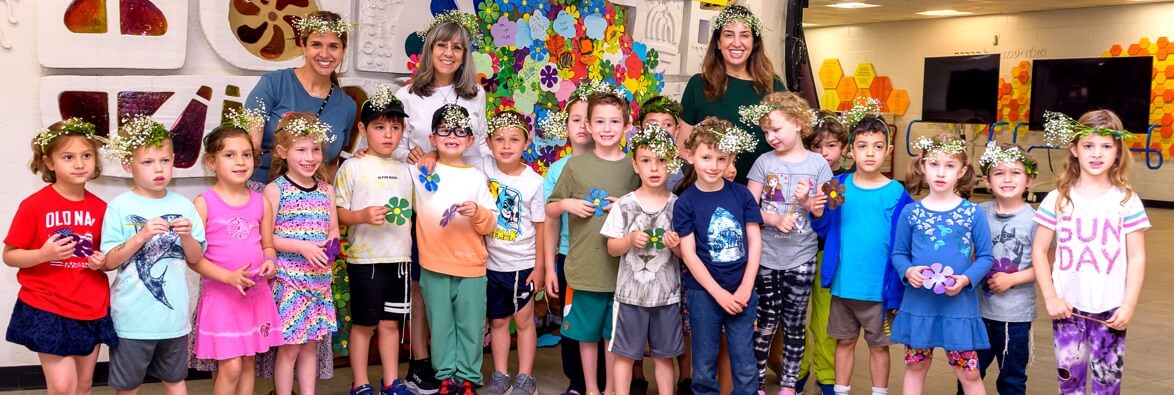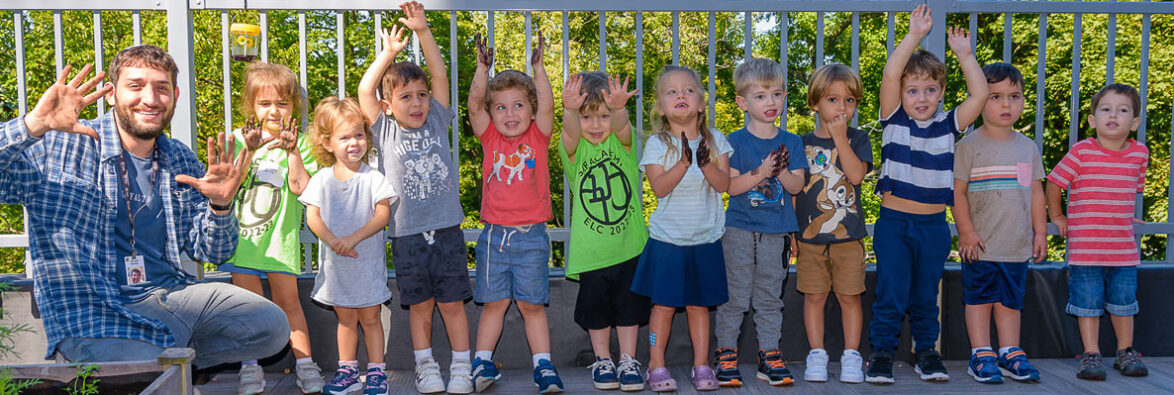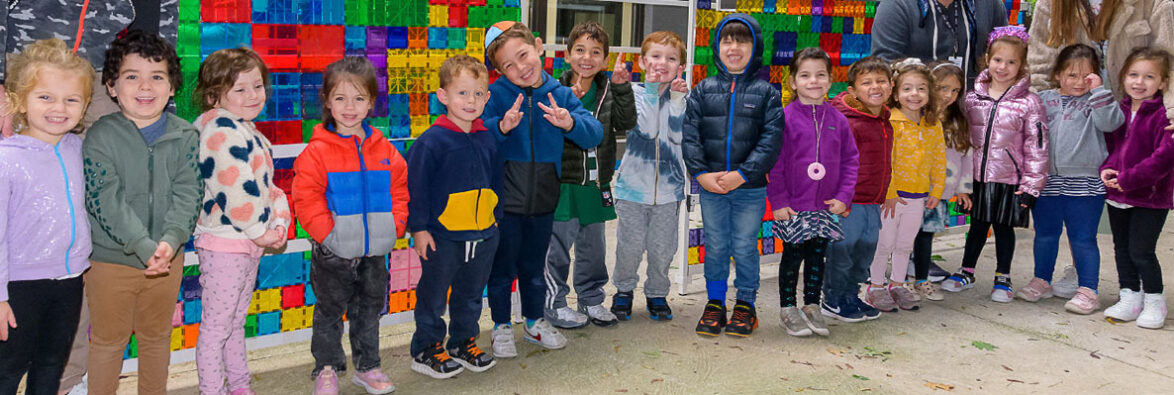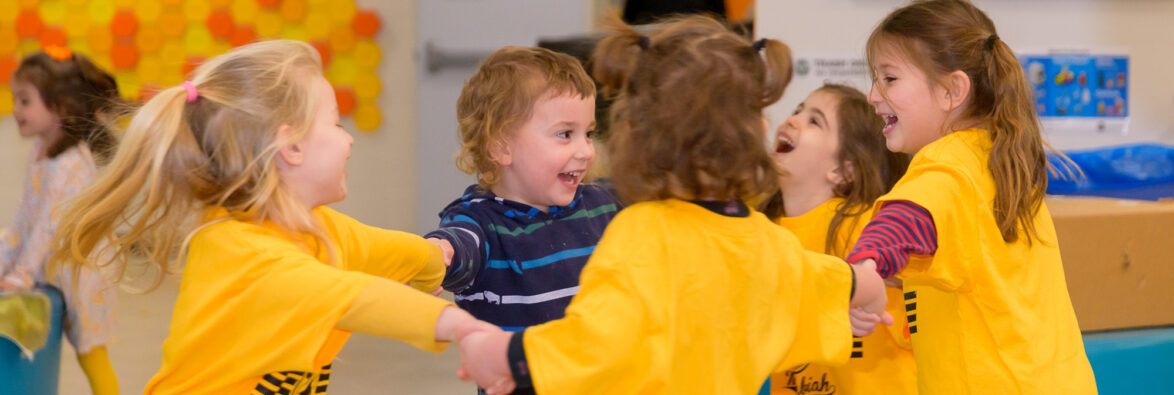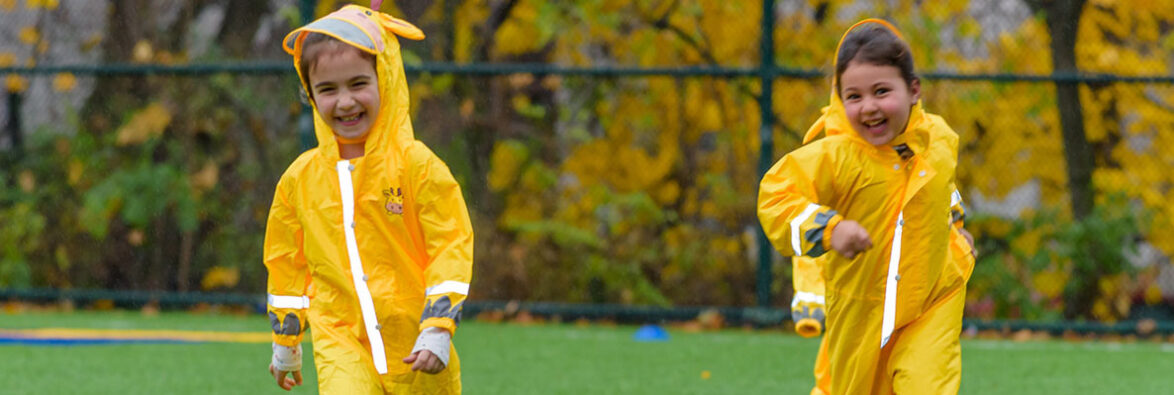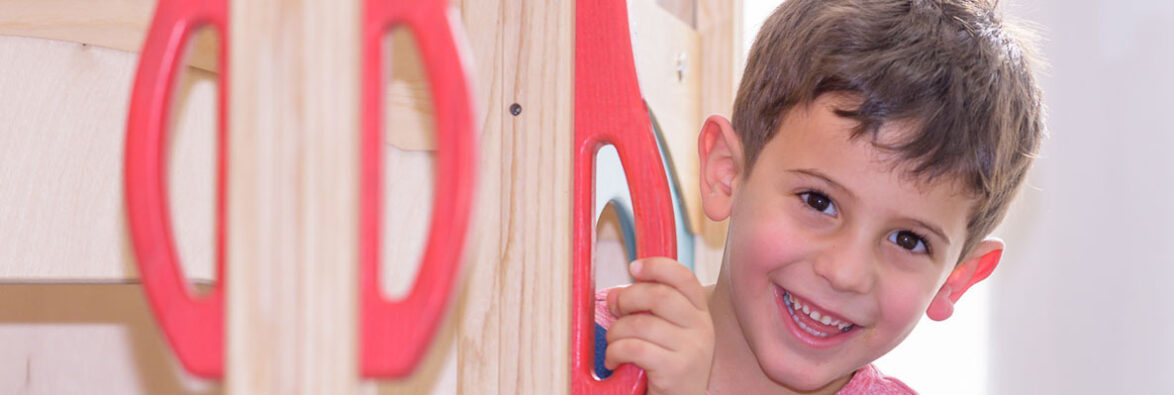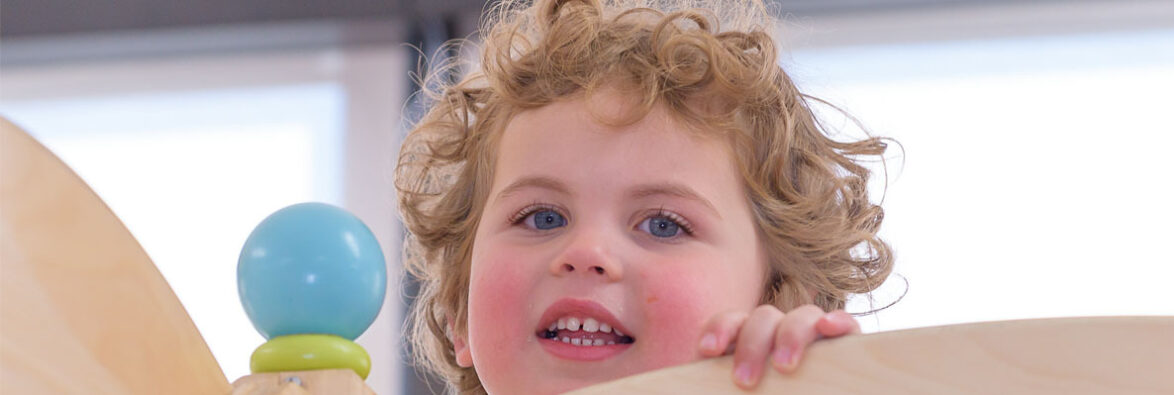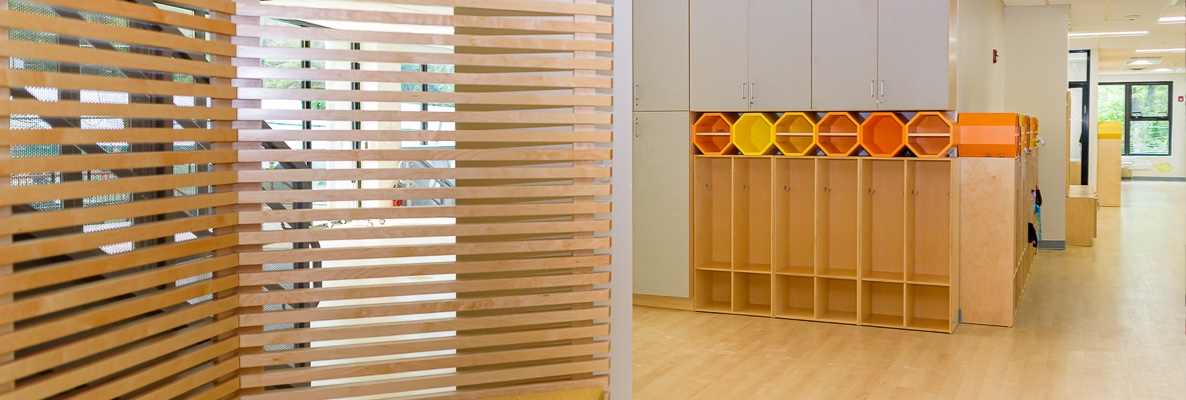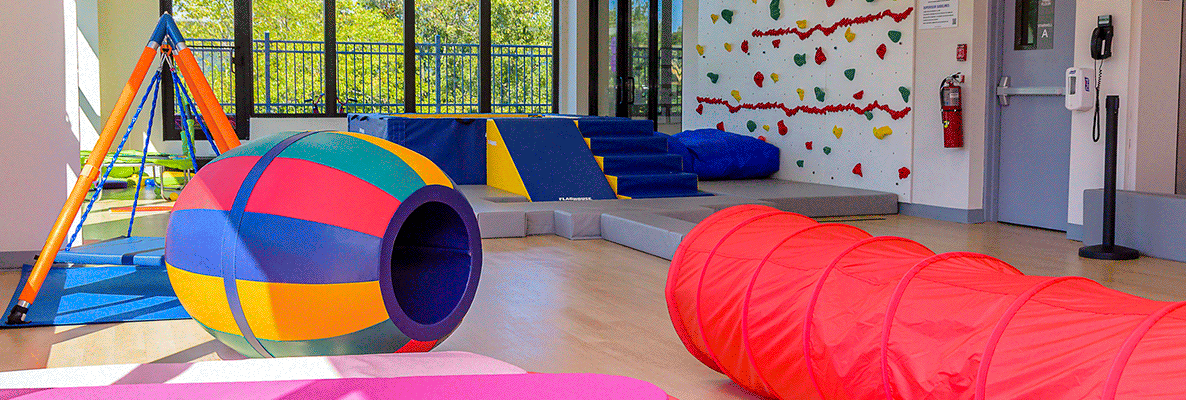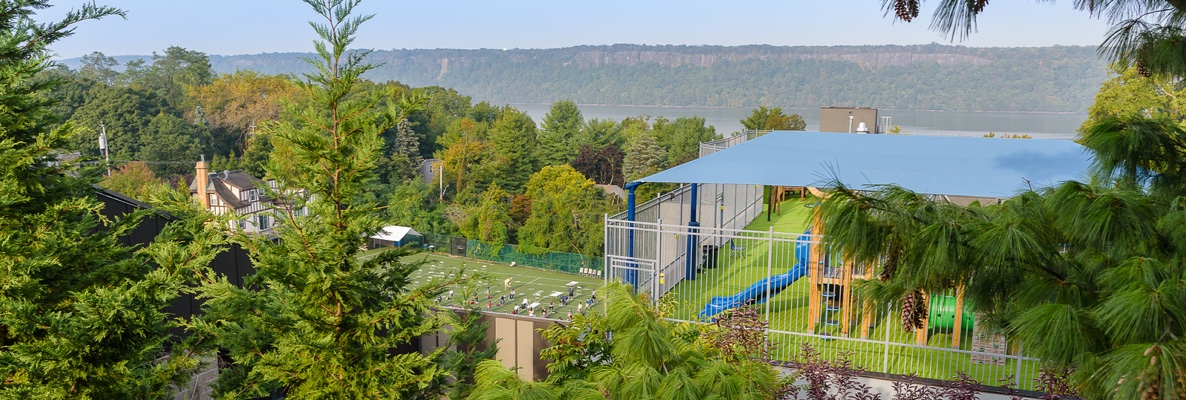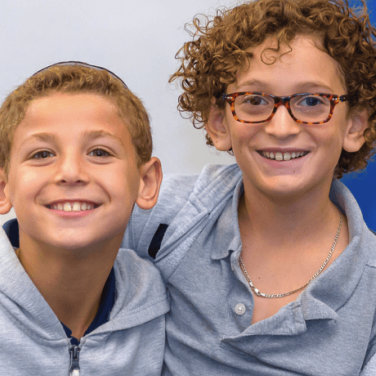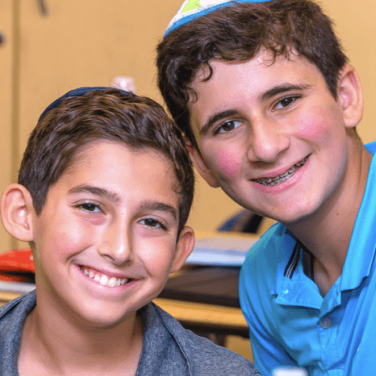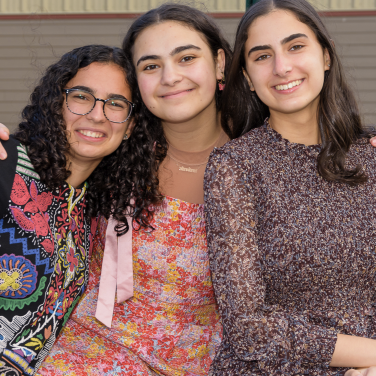The ELC Experience
-
Jewish Living & Learning
Every day, we live Judaism joyfully—interacting with one another and the world at large in ways that reflect respect, collaboration, and a shared commitment to Torah and mitzvot. In order to experience all that we teach, SAR has a longstanding tradition of holding school during Chol HaMoed Sukkot, Chanukah, and Purim. Our school days enhance each chag by giving us the opportunity to celebrate and learn in experiential ways, from sukkah hopping on Sukkot and school-wide candle lighting on Chanukah. Every Rosh Chodesh, we strive to create an environment that celebrates the unique spirit of the day. We ask students to dress in blue and white (on the first day of Rosh Chodesh when it is two days) on these days.
Tefillah
Developing deep connections to Hashem is a paramount value at SAR. Beginning in our Early Learning Center (ELC), children participate in daily tefillah, connecting to traditional tefillot and learning so that they can communicate with Hashem each day. In our ELC we follow a spiral curriculum in which we add tefillot each year, focusing on quality and understanding of the tefillot that we say. Through this curriculum, students learn about the tefillot deeply and connect to them personally.
Jewish Texts
Beginning in our ELC, children have the opportunity to learn the weekly parsha in and out of their classrooms. Our ELC students engage in interactive and fun parsha learning with Principal Rabbi Binyamin Krauss. Hands-on experiences that connect children to the texts we learn, our holidays, and the Torah values we embrace take place throughout the grades. Children enjoy visits from Noach and his teva filled with animals, perform acts of chesed in our chesed tent in honor of Parshat Vayera, ride ponies to simulate Mordechai’s experience in Shushan, learn with their family members at a Rashi evening, and spend time with their grandparents exploring Jewish texts.
As they rise into the Academy, students will be charged with learning the texts of the Torah and spend time in their classes deciphering the text and exploring it. We begin teaching Chumash in Grade 2, Rashi in Grade 3, Navi in Grade 4, Mishna in Grade 5, and Gemara in Grade 6. All classes are Ivrit b’Ivrit, although students with limited Judaic Studies skills can be placed in classes primarily taught in English when they reach Middle School. -
Literacy and Language Development
All of the classrooms in the ELC are language-rich environments featuring a variety of literature in order to instill a lifelong love of books and reading. Within the context of playful and developmentally appropriate classroom activities and experiences, the focus for our youngest nursery students is to use language to communicate with others, tell simple stories, and use sentences with two phrases or concepts. We encourage emerging literacy skills including holding a book upright and turning pages, identifying main characters in familiar stories, and knowing some letter names.
For our 4N students, we focus on language skills such as rhyming and labeling common objects, arranging a picture story in proper sequence, and retelling a story or experience and answering questions about the content. Literacy and pre-reading goals in 4N include recognizing some common words in print, recognizing many upper and lowercase letters, recognizing some letter sounds, and trying to read environmental print, such as street signs, cereal boxes, and exit signs.
In Kindergarten, we aim to develop literacy skills including recognizing and printing all capital and lowercase letters, associating letters and sounds, recognizing rhyming patterns, making predictions about a story based on its title and/or pictures, recognizing high frequency words, isolating CVC (consonant, vowel, consonant) words, and counting, pronouncing, and blending syllables in spoken words.
-
Math and Science
Children in the ELC construct their knowledge of math and science through hands-on experiences, questioning, and theorizing. Our 2N and 3N students are exposed to early mathematical concepts such as identifying shapes, counting, sorting, using size and amount words such as “many,” and distinguishing between “some” and “all” and parts of a whole. In 4N, we focus on recognizing most numerals 1-10, and understanding addition and subtraction, simple patterns, and abstraction—counting things we cannot see or touch such as days or siblings that are elsewhere. Science exploration in 4N allows students to make observations, test predictions, and explore elements of the world via experimentation and recording of results.
In Kindergarten, we aim to develop skills including naming and writing numerals, counting by 1s and 10s, solving problems by guessing and checking using manipulatives or fingers, decomposing numbers less than or equal to 10 into pairs in more than one way, understanding the calendar and the concepts of telling time, and knowing the days of the week and months of the year. In science, in addition to experimenting by making hypotheses, observations, and recording results, we integrate Judaic studies and science. Our weekly Shabbat activities and holiday discussions are the perfect forum for science-in-action! Students watch yeast rise while baking challah and observe apples turn brown as they oxidize after skin is removed, make grape juice for Pesach and transform the grape from solid to liquid, learn about the salt water of the Dead Sea to explore sinking and floating, and much more!
-
STEM
We offer a wide array of STEM (Science, Technology, Engineering, and Math) opportunities to better prepare our students of all ages for the 21st century. Our STEM activities range from curricular enhancements within the classrooms to specialties during the school day and electives offered as after school programming. In Kindergarten, STEM lessons surrounding curricular content of chagim and parsha are taught.
-
Hebrew Immersion and Israel
Hebrew Immersion
Our expert Hebrew language immersion teachers use proven language acquisition techniques to enable students to build their Hebrew skills as they progress through the grades. Through songs, stories, pictures, body language, creative games and more, students learn Hebrew and gain proficiency while having fun. Our Hebrew immersion teachers receive ongoing training throughout the year to help students practice reading, writing, speaking and listening in Hebrew.
ELC students are immersed in Hebrew language from the very first day of school. Through natural communication, children are exposed to Hebrew language throughout the day, hearing and speaking Hebrew during all of their experiences in the classroom—whether constructing in the block area or while engaged in dramatic play. This authentic communication allows students to learn a second language in a similar manner to the way that they learned their first.
Each 3N, 4N, and Kindergarten class is staffed with two head teachers, one English-speaking and one Hebrew-speaking. The goal for all ELC students is to gain familiarity with spoken Hebrew language and to become increasingly comfortable using common vocabulary words, phrases, and even more complex sentences as the school year progresses.
Israel
One of our core values at SAR is the love of, support of, and connection to Medinat Yisrael. Our students are infused with a love of Israel in our classrooms in both Judaic Studies and General Studies and outside of our formal learning setting through a dedicated Israel curriculum (developed by the Lookstein Center at Bar Ilan University) taught throughout the year in Grades 1-8; hands-on lessons about ancient and modern Israeli history; discussions about current events in Israel; streams of blue and white clothing on Rosh Chodesh; chagigot, daglanut, and a community barbeque on Yom Ha’Atzmaut; a solemn, student-led ceremony on Yom HaZikaron to honor victims of terror and chayalim who have lost their lives while defending Medinat Yisrael; and more.
-
Art Sparks
The Art Sparks Team in the ELC work cohesively to create child-centered classes that facilitate growth, exploration, creativity, and skill development.
Music: Art classes are all approached with a sense of fun and play, while using the time of year to frame what they are singing about. The children love experimenting with different instruments, and are able to practice their listening and musical abilities beginning in 2N. In 4N and K the children begin playing with music theory, which includes concepts such as steady beat, music games and how to use our bodies with music.
Art: Beginning in 2N and 3N, we expose the children to different materials, textures and best practices. We break directions down into small steps, and create opportunities for children to explore and engage their creative sides. In 4N and K, the children have a bit more independence, as they look at art together as inspiration, but not to copy. We encourage them to look for what they notice and see as a jumping off point for their art work.
Movement: In 2N, children work on movement-based classroom routines, as well as following directions, coordination, and gross motor skills (such as bear crawls and hops). As they get older, Movement furthers their understanding of different movements, and what it means to have personal and shared space. This idea of spatial awareness and how we shape our bodies is explored through yoga poses, dance and movement, where children are ultimately encouraged to create movement sequences of their own! It is emphasized throughout all ages the importance of mindfulness and breathing and helps all children practice their executive functioning and motor planning skillset.
Teva: Beginning in 2N, children are exposed to different animals and encouraged to explore their sense of touch. Some animals that visit the ELC are chinchillas, snakes, rabbits, turtles, dogs, parakeets and ladybugs! The program also brings children to Gan Ilan, our special rooftop garden, where they learn how we care for a plant in the fall, what happens to the plants in the winter, and how we start the cycle again in the spring. This also enables children to engage with the dirt, mud, and leaves. We also take advantage of our backyard–the Hudson! Children go on hikes nearby and are able to see the foliage and cultivate an appreciation for nature.
-
Pisgah (Kindergarten)
At SAR, we believe in creating a culture and infrastructure of inclusion and are committed to supporting the growth and learning needs of ALL children. Pisgah in Kindergarten offers a hybrid approach allowing students to receive the support they need while also allowing for them to be in a general classroom setting. Each Pisgah cohort consists of a small group model of generally no more than five students. A team made up of a Special Education teacher, General Education teacher, Speech Pathologist, Behaviorist, and Occupational Therapist work together to create goals for each individual student. Once goals are set, a schedule is created with a mix of push-in and pull-out remedial services to support the child toward meeting those goals. This methodology allows for strong peer models, access to a rich, robust curriculum, and the intensive support a student may need.
The Pisgah program has two tracks:
- Language-Based Learning Disabilities/Dyslexia Track: For some students, language-based learning disabilities, including dyslexia, interfere with their ability to learn to read and write with ease.
- Sensory Integration and Executive Function Track: For some students, social and emotional learning challenges, including sensory integration and executive function deficits, result in a level of dysregulation that interferes with their ability to reach their potential academically and/or socially.
Pisgah is the Hebrew word for summit, and reflects SAR’s commitment to ensuring that students are given the support they need to climb their own personal mountain and reach their own personal summit in an educationally and socially supportive community environment.
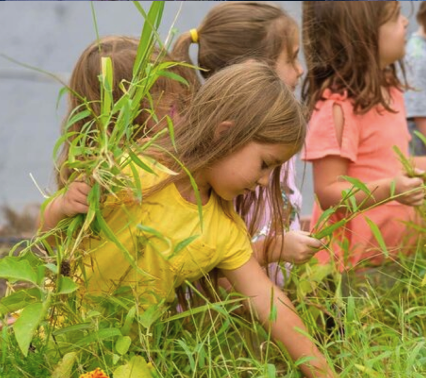
Our School
Our constructivist approach allows children to construct knowledge by asking questions, making connections out of their experiences, and learning actively by doing.
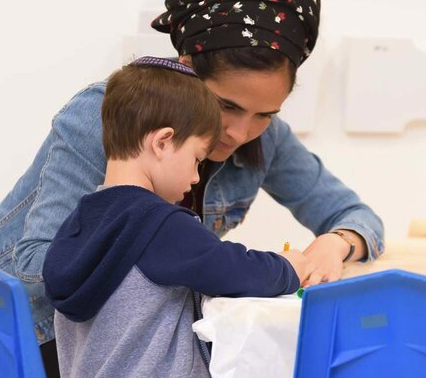
Our Approach
At the Early Learning Center (ELC), SAR’s school for children ages 2-6, we create a joyous and loving Jewish environment filled with experiential learning, passionate and nurturing teachers, Hebrew immersion, and STEAM-focused curricula.
Our Mission
SAR Academy is a Modern Orthodox co-educational day school dedicated to the belief that every child possesses a divine spark, has unique worth as an individual and should be encouraged to achieve according to his or her ability.
Our Mission
SAR Academy is a Modern Orthodox co-educational day school dedicated to the belief that every child possesses a divine spark, has unique worth as an individual and should be encouraged to achieve according to his or her ability. Our warm environment promotes confidence, creativity and enthusiasm for learning. In our approach to academics, we nurture students to develop intellectual curiosity, critical thinking skills and a lifelong love of both Torah and Secular studies. We have created a program committed to excellence in every aspect of our educational goals:
- To foster a community of b’nai and b’not torah who demonstrate sensitivity for their peers, respect for their teachers and environment, loyalty to their country, and an appreciation of the differences in others.
- To advance and develop each student towards a value and mastery of Hebrew language, Judaic Studies, and General Studies.
- To raise our students’ connection to Hashem (Ahavat Hashem and Yir’at Shamayim), commitment to Talmud Torah, observance of Mitzvot and connection to Medinat Yisrael.
- To educate by nurturing and challenging each student to reach his or her individual potential.

